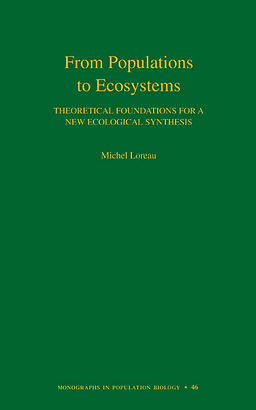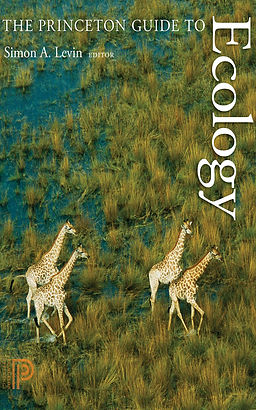Scientific ecology
BOOKS

Les conséquences écologiques et sociétales de la perte de biodiversité
Authors
Michel Loreau, Andy Hector, Forest Isbell (Eds)
Publishing house
ISTE, Londres, Royaume-Uni, 386 pp / 2024
> > > Find the book
This book is the French version of the book "The ecological and societal consequences of biodiversity loss", published two years earlier.
The ecological and societal consequences of biodiversity loss
Authors
Michel Loreau, Andy Hector, Forest Isbell (Eds)
Publishing house
ISTE, Londres, Royaume-Uni, et John Wiley & Sons, Hoboken, Etats-Unis, 353 pp / 2022
> > > Find the book

This book bears witness to the extraordinary scientific expansion and progress of research on the relationship between biodiversity and ecosystem functioning during the last three decades. It offers a comprehensive synthesis of current scientific knowledge on both the ecological and societal consequences of biodiversity loss for a wide audience of university students, researchers, managers and others interested in biodiversity. In this respect, it differs from previous books, which aimed to provide syntheses and perspectives for researchers working in the field.
The book provides a general overview of the concepts of biodiversity and ecosystems and changes in biodiversity in the past, present and future, before systematically reviewing the theoretical foundations, experimental evidence and field observations that demonstrate the consequences of biodiversity for ecosystem functioning, ecosystem stability, and human societies. Finally, it examines the feedbacks between biodiversity, climate change and society at the global level and the challenges associated with protecting and restoring biodiversity.

From populations to ecosystems
Theoretical foundations for a new ecological synthesis
Author
Michel Loreau
Publishing house
Monographs in Population Biology, Princeton University Press, Princeton, Etats-Unis, 297 pp / 2010
> > > Find the book
The considerable development of scientific ecology since its origins has been accompanied by the emergence of distinct sub-disciplines, each with its own concepts and research programmes. However, in order to meet the challenges of the ecological crisis affecting all levels of organisation of life, ecology today is in dire need of an integrative approach that encompasses the dynamics of population and biodiversity, the evolution of species, and the functioning of ecosystems and the biosphere. The aim of this book is precisely to propose an innovative theoretical synthesis that paves the way for such integration.The book begins by explaining how the principles of population dynamics and ecosystem functioning can be merged. It then draws on the latest theoretical advances to identify the principles that link the microscopic properties of populations to the macroscopic properties of ecological systems, with a particular focus on the relationship between biodiversity and ecosystem functioning. Finally, it addresses the controversial issue of ecosystem evolution, laying the theoretical foundations for a genuine evolutionary ecosystem ecology.
The Princeton guide to ecology
Authors
Simon A. Levin, Stephen R. Carpenter, H. Charles J. Godfray, Ann P. Kinzig, Michel Loreau, Jonathan B. Losos, Brian Walker, David S. Wilcove (Eds)
Publishing house
Princeton University Press, Princeton, Etats-Unis, 809 pp / 2009
> > > Find the book

The Princeton Guide to Ecology is an authoritative reference to ecology. It contains more than ninety articles that present the current state of knowledge in seven major areas: autecology, population ecology, communities and ecosystems, landscapes and the biosphere, conservation biology, ecosystem services, and biosphere management. Complete with more than 200 illustrations, a glossary of key terms, a chronology of milestones in the field, suggestions for further reading on each topic, and an index, it provides a clear, accessible, and comprehensive overview of modern scientific ecology.

Biodiversity, ecosystem functioning, and human wellbeing
An ecological and economic perspective
Authors
Shahid Naeem, Daniel E. Bunker, Andy Hector, Michel Loreau, Charles Perrings
Publishing house
Oxford University Press, Oxford, Royaume-Uni, 368 pp / 2009
> > > Find the book
Seven years after the publication of "Biodiversity and ecosystem functioning: synthesis and perspectives", this book offers a new synthesis of research conducted in the interim on the relationships between biodiversity and ecosystem functioning. Its main originality compared with the previous book lies in the inclusion of an economic approach that seeks to quantify the impact of biodiversity loss on human wellbeing.
Biodiversity and ecosystem functioning
Synthesis and perspectives
Authors
Michel Loreau, Shahid Naeem, Pablo Inchausti
Publishing house
Oxford University Press, Oxford, Royaume Uni, 294 pp / 2002
> > > Find the book

The relationship between biodiversity and ecosystem functioning is now the subject of a field of research in its own right, which has already given rise to thousands of scientific papers. But this has not always been the case. Its beginnings in the 1990s were particularly turbulent, with heated controversies between some of the big names in ecology, who held firmly to their positions.
In an attempt to resolve these controversies and develop a more consensual view, I organised, with two colleagues, an international conference that brought together all the key players and a wide range of young researchers interested in this new field of research in Paris in 2000. The conference was a resounding success, giving new impetus to this field of research and producing a series of scientific papers that have left their mark on the history of the discipline.This book reflects the richness of this conference: it explores the many facets of the links between biodiversity and ecosystem functioning, takes stock of the research carried out to date, and identifies new perspectives for future research.
